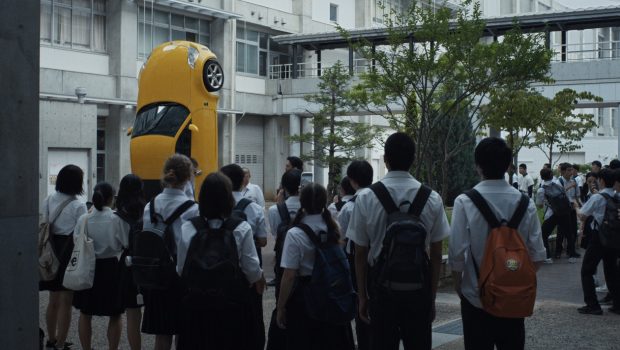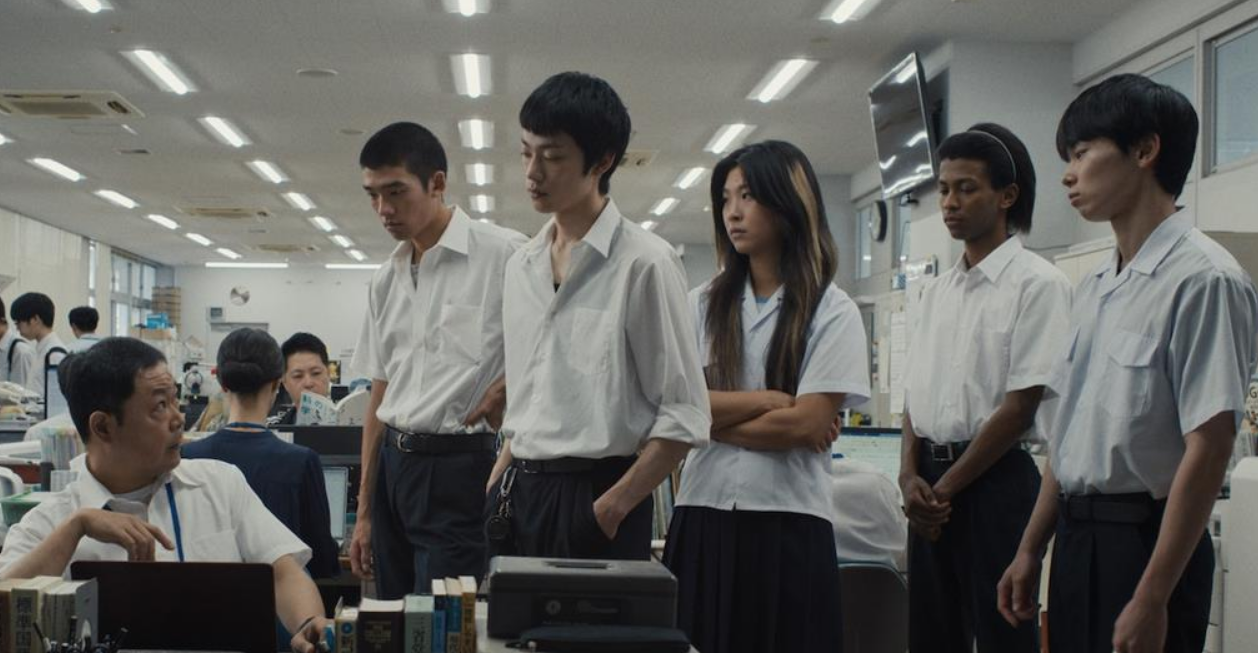Happyend – Film Review
Reviewed by Harris Dang on the 30th of October 2025
NIXCO presents a film by Neo Sora
Written by Neo Sora
Produced by Albert Tholen, Aiko Masubuchi, Eric Nyari, Anthony Chen, Alex C. Lo
Starring Hayato Kurihara, Yukito Hidaka, Yuta Hayashi, Shina Peng, ARAZI, Kilala Inori, Ayumu Nakajima, Masaru Yahagi, PUSHIM, Makiko Watanabe, Shirō Sano
Cinematography Bill Kirstein
Edited by Albert Tholen
Music by Lia Ouyang Rusli
Rating: M
Running Time: 113 minutes
Release Date: the 30th of October 2025
Set in the distant future of Tokyo, Happyend tells the story of Yuta (Hayato Kurihara) and Kou (Yukito Hidaka), two best friends on the cusp of graduating high school. Kou, a Zainichi Korean, is an introverted young man who is comfortable assimilating to the world around him while Yuta is more care-free and devil-may-care. Both are very aware of the inevitability looming over them. The gradual escalation of a fascist government circles under the threat of a catastrophic earthquake.
Soon a large yet innocent prank angers Principal Nagal (Shiro Sano) into thinking it was an act of terrorism. Consequently, Nagal establishes a surveillance system, which sees the students lose their basic human rights. This sparks a fire in some students, including Tomu (Arazi), Ming (Shina Peng) and Ata-chan (Yuta Hayashi), Fumi (Inori Kilala), to fight back for what’s theirs, including their freedom.
The synopsis on face value sounds simplistic and predictable in conception. However, it is a testament to Neo Sora’s storytelling that the film’s lingering, powerful impact makes Happyend one of the year’s best films. Sora is a Japanese-American filmmaker, best known for his striking music videos and his first feature-length film Ryuichi Sakamoto: Opus (2023). It was a documentary detailing the titular musician’s last concert, who happens to be Sora’s father. With Happyend, the restraint of his first narrative effort is striking and impressive.
Sora’s assured filmmaking replaces urgency with contemplation. He utilises stark and sterile compositions (thanks to cinematographer Bill Kirstein), sparse emotionally stirring music (by Lia Ouyang Rusli), and long takes (with strong support from editor Albert Tholem). In effect, this creates a sense of ennui and a lingering sense of impending doom. It vividly captures the characters’ lives and accentuates the story’s power with clarity and eloquence.
While set in futuristic Tokyo, the storytelling is timely and urgency, and its thematic intent creates a startling vision of the future. Sora establishes these ideas succinctly in the opening scene where our two leads crash into a nightclub to dance and enjoy the night. The authorities raid the club and consequently have the DJ share his music with our leads to keep the night going.
The use of surveillance technology via the authorities to keep order and track one’s identity via smartphones is menacingly prescient and strikingly literate and timely. Similarly, the high school setting is the perfect microcosm for conveying the effects of totalitarianism in an emerging world.
The students’ complacency, apathy, and adversity is gripping in its understatement and nuance. It is powerful due to how sympathetic and empathetic the students are. Their enthusiasm, angst, naivety, tenacity, and curiosity of the world is portrayed with compelling, natural performances by the young cast. It leads them to abrupt stages of maturity that is beautiful and alarming in its coming-of-age elements. First love, appreciation of art and creativity, and gradual divergence in opposing worldviews, all emerge.
Their curiosity invites indoctrination from adults (the police and school principal) and duplicitous behaviour under the false guise of goodwill. The notion of establishing the school security system as security splits the students’ views. It easily warps the minds of agreeable students while others have independent thoughts and believe there is something bigger beneath the surface.
Overall, Neo Sora’s Happyend is a fantastic film that blends a heartfelt coming-of-age drama with striking social commentary. The assured filmmaking, nuanced storytelling, and an ensemble cast of youthful exuberance makes it highly recommended.
Summary: Happyend is a fantastic film that blends a heartfelt coming-of-age drama with striking social commentary. Highly recommended.








